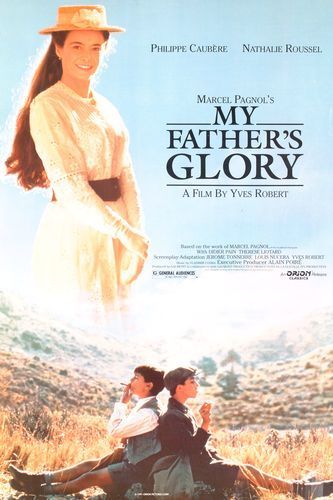
| None | Light | Moderate | Heavy | |
|---|---|---|---|---|
| Language | ||||
| Violence | ||||
| Sex | ||||
| Nudity |
Content:
(N, L, H) Nude little boys washing outside (but presented in an innocent, inoffensive manner) and mother’s breast while breast-feeding (presentation, here, too, is in a natural, not offensive style)
More Detail:
MY FATHER’S GLORY is the first of Yves Robert’s two charming movies based on the sweet reminiscences of Marcel Pagnol, novelist, playwright, filmmaker, schoolteacher, and translator of Shakespeare.
Born in Aubagne, France on February 28, 1895 to Augustine Lansot, a traditional, ebullient seamstress, and iconoclastic yet rigorous schoolteacher, Joseph Pagnol, Marcel Pagnol spent his childhood in Marseille. MY FATHER’S GLORY and MY MOTHER’S CASTLE are told from a fond, sardonic perspective and are based on the real experiences, especially “little moments,” of these years of adolescent passage.
Much of the film covers the time Pagnol’s family spent in the mountains, during the summer, when Pagnol not only stretched his wings but gained a deeper love and understanding of his father. The author tends to dwell on pleasant childhood experiences and to be overly romantic concerning his past, but overall, in this lilting reminiscence, there are a warm precision and perceptive insights. Thus, Pagnol idealizes his father throughout, but, most poignantly, he comes to love him most when he sees past his own boyish wonder and appreciates his father as a man, with all his idiosyncrasies, weaknesses and contradictions.
In the film, the small experiences and happenings in life are the ones cherished and remembered. For example, in a partridge-killing incident, Marcel exclaims: “I raised my father’s glory to the sky!” However, as Christians, we take comfort in the knowledge that unlike the dead partridges, Jesus was not abandoned to the grave but God raised him to life, the ultimate glory of the Father. In fact, as believers in Christ and His work on the Cross, we reflect the Lord’s glory “with unveiled faces we are being transformed into His likeness with ever-increasing glory which comes from the Lord, who is the Spirit” (II Corinthians 3:18 (NIV)).
MY FATHER’S GLORY is filled with mirth, vitality and a gentle liveliness as young Pagnol struggles with his Catholic mother’s “childish” notions of religion versus “the miracles of science” that “will bring joy to the poor and humble.” Pagnol’s father, an intellectual humanist who represented turn-of-the-century pre-modernism and “paternal omnipotence,” offered these views to his son while his mother often took Marcel to church and gave him a spiritual view of life.
Screenplay writer Roberts considers Pagnol a humanist, and as such, believes that he had extraordinary knowledge of human beings, men, women, and children, along with math, botany, birds, and the natural sciences, and that Pagnol brought this universality to his works, which radiate natural knowledge. Unfortunately, Pagnol did not know the Creator of this magnificent world for then his knowledge would have been made complete by the wisdom that only comes from a personal relationship with the awesome, sovereign God who became flesh and lived among us.
Moreover, Roberts picks up on Pagnol’s use of language, especially as spoken in regional dialect, a key to the emotional power to this film. MY FATHER’S GLORY is distinctively diffused with the language and character of Provence and is reinforced by Vladimir Cosma’s wonderfully fitting musical score complete with Provence breezes, bursts of bird chirrups and sea swells. The film’s lighting, setting, and style resemble that of an Impressionist painting and are augmented by the fine performances of Ciamaca as Marcel and Caubere as his inimitable father.
Worthy of note is the characterization of Marcel’s mother, Augustine. She is depicted as a woman who knew to invite her son to dream, to discover with her the important things in life. In Augustine there is an immense force of love which prevents her from being passive. One has the feeling of her being Joseph’s (Pagnol’s father) wife, a wife who is beloved. Augustine is not reduced to only having the role of a mother: she appears as a woman, in her simplicity, and in her mystery. Such a fine, warm depiction of a woman contrasts sharply with Hollywood’s portrayal of women, often as sex objects, and is yet another reason why MY FATHER’S GLORY proves to be an exceptional film.
Born in Aubagne, France on February 28, 1895 to Augustine Lansot, a traditional, ebullient seamstress, and iconoclastic yet rigorous schoolteacher, Joseph Pagnol, Marcel Pagnol spent his childhood in Marseille. MY FATHER’S GLORY and MY MOTHER’S CASTLE are told from a fond, sardonic perspective and are based on the real experiences, especially “little moments,” of these years of adolescent passage.
Much of the film covers the time Pagnol’s family spent in the mountains, during the summer, when Pagnol not only stretched his wings but gained a deeper love and understanding of his father. The author tends to dwell on pleasant childhood experiences and to be overly romantic concerning his past, but overall, in this lilting reminiscence, there are a warm precision and perceptive insights. Thus, Pagnol idealizes his father throughout, but, most poignantly, he comes to love him most when he sees past his own boyish wonder and appreciates his father as a man, with all his idiosyncrasies, weaknesses and contradictions.
In the film, the small experiences and happenings in life are the ones cherished and remembered. For example, in a partridge-killing incident, Marcel exclaims: “I raised my father’s glory to the sky!” However, as Christians, we take comfort in the knowledge that unlike the dead partridges, Jesus was not abandoned to the grave but God raised him to life, the ultimate glory of the Father. In fact, as believers in Christ and His work on the Cross, we reflect the Lord’s glory “with unveiled faces we are being transformed into His likeness with ever-increasing glory which comes from the Lord, who is the Spirit” (II Corinthians 3:18 (NIV)).
MY FATHER’S GLORY is filled with mirth, vitality and a gentle liveliness as young Pagnol struggles with his Catholic mother’s “childish” notions of religion versus “the miracles of science” that “will bring joy to the poor and humble.” Pagnol’s father, an intellectual humanist who represented turn-of-the-century pre-modernism and “paternal omnipotence,” offered these views to his son while his mother often took Marcel to church and gave him a spiritual view of life.
Screenplay writer Roberts considers Pagnol a humanist, and as such, believes that he had extraordinary knowledge of human beings, men, women, and children, along with math, botany, birds, and the natural sciences, and that Pagnol brought this universality to his works, which radiate natural knowledge. Unfortunately, Pagnol did not know the Creator of this magnificent world for then his knowledge would have been made complete by the wisdom that only comes from a personal relationship with the awesome, sovereign God who became flesh and lived among us.
Moreover, Roberts picks up on Pagnol’s use of language, especially as spoken in regional dialect, a key to the emotional power to this film. MY FATHER’S GLORY is distinctively diffused with the language and character of Provence and is reinforced by Vladimir Cosma’s wonderfully fitting musical score complete with Provence breezes, bursts of bird chirrups and sea swells. The film’s lighting, setting, and style resemble that of an Impressionist painting and are augmented by the fine performances of Ciamaca as Marcel and Caubere as his inimitable father.
Worthy of note is the characterization of Marcel’s mother, Augustine. She is depicted as a woman who knew to invite her son to dream, to discover with her the important things in life. In Augustine there is an immense force of love which prevents her from being passive. One has the feeling of her being Joseph’s (Pagnol’s father) wife, a wife who is beloved. Augustine is not reduced to only having the role of a mother: she appears as a woman, in her simplicity, and in her mystery. Such a fine, warm depiction of a woman contrasts sharply with Hollywood’s portrayal of women, often as sex objects, and is yet another reason why MY FATHER’S GLORY proves to be an exceptional film.


 - Content:
- Content: 


